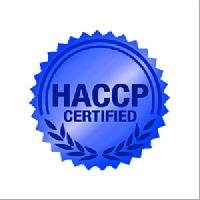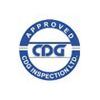
Haccp Certification Services
Get Price Quote
HACCP Certification Service HACCP stands for Hazard Analysis Critical Control Point. HACCP system that includes a series of procedures for process control and sensitive points in the food chain, with the ultimate aim that the consumer uses the food in the state and in a manner that will be safe for his health. HACCP system in seventies became recognized as an international standard for food production. The certification process for HACCP is similar to any other certification schemes. This process is divided into 5 steps: Preparation of HACCP Development of HACCP plan Implementation of HACCP plan HACCP certification the system by the international certification body Maintenance and monitoring of the HACCP system HACCP Principals : The implementation of hazard analysis Determine Critical Control Points (CCP). For each risk identified. Establishing critical limits, maximal and/or minimum value, by which biological, chemical and physical hazards in order to control the pedagogical prevention. Determination of procedures/processes for monitoring CCPs Determination of corrective measures in case the monitoring shows that the CCP is not within the critical limits. Establish procedures/processes for verification and certification procedures and the HACCP system is effective and it works well. The verification activities should be included authorized persons employed in production, the HACCP team. The establishment and effective management of records and documents

haccp certification service
Get Price Quote
HACCP stands for Hazard Analysis and Critical Control Point. The HACCP system, as it applies to food safety management, uses the approach of controlling critical points in food handling to prevent food safety problems
Looking for HACCP Certification Services Providers

Haccp Certification Services
Get Price Quote
Haccp can be considered a management system that addresses food safety through the analysis and control of biological, chemical, and physical hazards right from raw material production, procurement and handling, to manufacturing, distribution and consumption of the finished product. It's designed to be used in all segments of the food industry, and all the safety systems based on haccp principles have been successfully applied. Globally, food industries, as well as government agencies have accepted the seven principles of haccp, which are: analyze hazards determine the critical control points (ccps) establish preventive measures with critical limits for each control point establish procedures to monitor the critical control points establish corrective actions to be taken when monitoring shows that a critical limit has not been met establish procedures to verify that the system is working properly establish effective record keeping to document the haccp system advantages haccp offers a number of advantages focuses on identifying and preventing hazards from contaminating food enhanced assurance of food safety better management of resources timely response to problems is based on sound science permits more efficient and effective government oversight helps food companies compete more effectively in the world market reduces barriers to international trade

Haccp Certification Services
Get Price Quote
Iso 22000 / haccp is premier food safety management system standard used throughout the world in food industry. It is a preventive quality management system designed for providing intensified controlling and monitoring during important processes of food suppliers that helps to improve their food safety and quality but is also able to make profits through cost reduction and reduced rejections. haccp is built around seven principles analysis of food hazards: biological, chemical or physical identification of critical control points: raw materials, storage, processing, distribution and consumption establishment of critical control limits and preventive measures: for example, minimum cooking temperature and time monitoring of these critical control points establishment of corrective actions keeping records establishing a systematic and regular auditing of the system in place by independent third party certification bodies. benefits of implementing haccp haccp can be applied throughout the food chain from the primary producer to final consumer : haccp reduces the need for finished product testing by identifying the hazards associated with the inputs into the process and the product and devising control measures which can be monitored in order to minimize or eliminate the hazards. haccp will significantly reduce the chance of microbiological, chemical, and physical contaminants from reaching the customer. haccp can reduce regulatory involvement (and hence costs) by replacing on-line inspection with regular auditing. haccp principles can be applied to other aspects of food quality and regulatory requirements. haccp improves communications between supplier and customer. It encourages businesses to work together more closely. haccp is capable of accommodating changes such as advances in raw materials, equipment and premise design, procedures, and technological developments. it improves customer confidence leads to increased market share.

Haccp Certification Services
Get Price Quote
We provide haccp certification services. haccp is a preventative approach to food safety and pharmaceutical safety which addresses physical, chemical, and biological hazards as a means of prevention rather than finished product inspection. Haccp is compatible with management systems, such as iso 9001and certification is recognized worldwide by government food authorities and food businesses. background haccp was developed as a microbiological food safety system for astronauts at the beginning of the manned us space program. The pillsbury company, nasa and the us army laboratories at natick pioneered the original system. At that time food safety systems were based on end-product testing. Ensuring full safety required testing 100 percent of the product. The preventive food safety system was born to ensure high level of food safety without using the entire product. haccp principles, developed by the codex alimentarius of the world health organization, demand that organizations establish effective food safety systems through the application of a systematic approach to hazard and risk analysis. This standard is used in the food industry to identify potential food safety hazards, so that key actions, known as critical control points (ccp's) can be taken to reduce or eliminate the risk of the hazards. food safety and public health agencies recognize haccp as the preferred tool for food safety assurance and improving regulatory food standards. The food safety and inspection service of the us department of agriculture (fsis-usda) mandated haccp in meat and poultry processing in 1996. The food and drug administration (fda) later mandated haccp for seafood and juices. The world health organization (who) advises the incorporation of haccp into international and national food legislation to improve food inspection efficiency. benefits provides employees with an understanding of the importance of producing safe food reduces spoilage costs helps reduce and possibly eliminate food safety liabilities improves consistency in product quality and safety improves business that relies on compliance with haccp gives customers increased confidence in your food safety improves competitiveness and makes your company a supplier of choice

Haccp Certification Services
Get Price Quote
The certificate issued by an independent accredited certification body guarantees that the food quality and safety management system has been established, documented and used in accordance with the requirements of haccp standard. Haccp is a prevention based food quality and safety management system. It provides systematic methods for analysing agricultural and food industry production processes, identification of all possible risks, hazard analysis, determining the critical control points necessary for ensuring quality and safety of food products and consistent management and control of such critical points. Haccp is based on codex alimentarius, developed by food and agricultural organization of the united nations and world health organization. Benefits of certification • attestation of suitability, efficiency and effectiveness of the established critical points system by a third independent party; • attestation of meeting the haccp requirements beyond the scope of the minimum requirements laid down by the national legislation; • meeting the requirements of the most demanding customers (trade chains and multinational companies); • guarantee of production process stability; • optimizing costs; • enhancing trust of the public and public monitoring bodies

HACCP Certification
Get Price Quote
HACCP Certification, ISO Consultants, FSSC 22000 certification

haccp certification service
Get Price Quote
Iso 9001 Certification Services, ohsas certification services

Haccp Certification Services
Get Price Quote
ohsas certification services, CE Marking Services